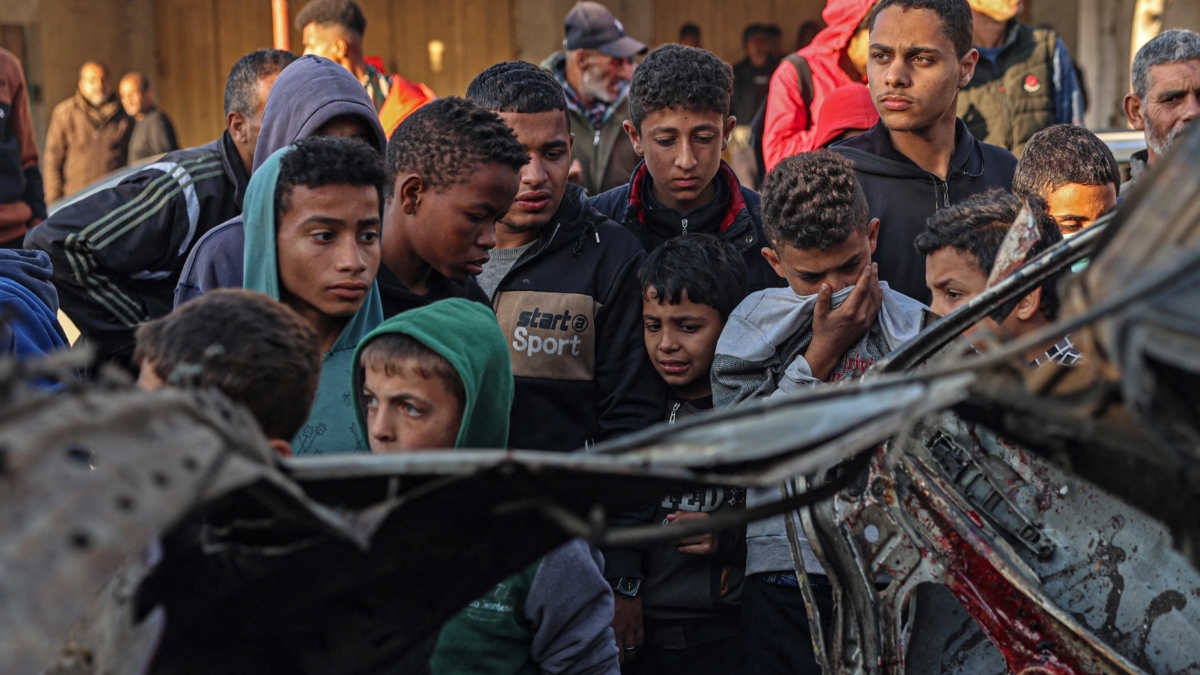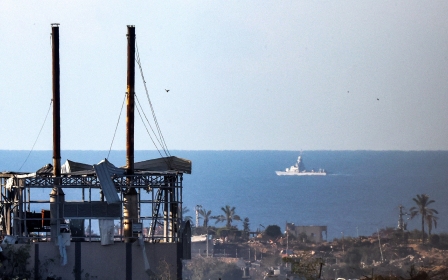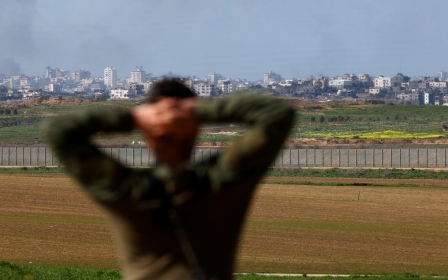Israeli ground offensive would turn Rafah into 'graveyard', leading rights experts warn

An Israeli ground offensive on Rafah would turn the Gaza border town teeming with refugees into a “graveyard”, the heads of leading humanitarian and human rights organisations warned at a special press briefing on Tuesday.
“The consequences of a full-scale assault on Rafah are truly unimaginable,” Avril Benoit, executive director of Doctors Without Borders in the US, said at the online press briefing.
“With people in makeshift shelters that can’t even protect against the cold, carrying out a military offensive there would turn it into a graveyard.”
Benoit spoke alongside senior executives from Medico International, Amnesty International, Refugees International, and Oxfam, warning that a looming Israeli invasion of Rafah, where 1.5 million Palestinians are sheltering in squalid conditions, could compound the already dire humanitarian situation in the war-ravaged enclave.
The executives described in gruesome detail the daily reality for aid workers and Palestinians in Gaza. Benoit said babies have had their legs amputated before they even learn how to walk and pregnant women are giving birth in tents on the street.
New MEE newsletter: Jerusalem Dispatch
Sign up to get the latest insights and analysis on Israel-Palestine, alongside Turkey Unpacked and other MEE newsletters
Sally Abi Khalil, regional director of Oxfam, said the impeding of humanitarian aid by Israel was “starvation as a weapon of war”.
Jeremy Konyndyk, president of Refugees International, said that the enclave is on a "very rapid path towards famine”. He blamed the inability of humanitarian groups to deliver supplies on Israel’s failure to establish a meaningful humanitarian deconfliction process, which is used in war zones to facilitate aid deliveries.
He said Israel was breaching an interim ruling by the International Court of Justice (ICJ) and called on it to refrain from impeding the delivery of aid into Gaza and improve the humanitarian situation, along with taking measures within its power to prevent acts of genocide in the besieged enclave.
On Tuesday, the UN announced the suspension of food aid in northern Gaza, saying the region had become plagued by "chaos and violence”.
The World Food Programme has warned that an alarming lack of food, rampant malnutrition and the rapid spread of disease could lead to an "explosion" in the number of child deaths in Gaza. An eight-year-old Palestinian girl died from dehydration and starvation in Gaza City, the NGO, Euro-Med Human Rights Monitor, reported on Saturday.
No end in sight
The UN’s announcement came as the US vetoed a Security Council resolution calling for an immediate ceasefire in Gaza, marking the fourth time Washington has blocked such a measure since the war began in October. Washington also vetoed in December an amendment calling for a ceasefire that Russia had tried including in a Security Council resolution.
As an alternative to the resolution on Tuesday, the US has offered its own counter-proposal that would condemn Hamas for launching the 7 October attacks on southern Israel, while calling for a ceasefire “as soon as practicable”, according to a copy of the draft document seen by Middle East Eye.
The US resolution also offers opposition to Israel's consideration of a full-scale offensive on Rafah based on the current situation on the ground in Rafah. It is in keeping with US officials’ public statements that Israel first presents a “credible” plan to remove civilians from the town before a ground offensive begins.
Konyndyk, from Refugees International, called that demand “a mirage” providing a “fig-leaf” for a potential Israeli offensive in the future.
“They (Palestinians) are in Rafah in the first place because the rest of Gaza has been made uninhabitable,” he said at the press conference.
The Gaza Strip has been decimated by air strikes and roughly 85 percent of Palestinians in the enclave have been displaced from their homes. Israel says it plans to displace Palestinians in Rafah to the north of the enclave where basic infrastructure has been obliterated.
“It worries me to be hearing this from the US government because it suggests that such a thing is possible, when it really is not.”
This article is available in French on Middle East Eye French edition.
Middle East Eye delivers independent and unrivalled coverage and analysis of the Middle East, North Africa and beyond. To learn more about republishing this content and the associated fees, please fill out this form. More about MEE can be found here.




